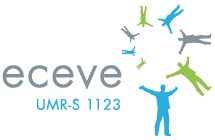Optimizing Communication on HPV Vaccination to Parents of 11- to 14-Year-Old Adolescents in France: A Discrete Choice Experiment
Résumé
Background: With the aim to optimize communication during HPV vaccination campaigns in France, we elicited parental preferences around HPV vaccination.
Methods: We conducted a single-profile discrete choice experiment (DCE) among parents of 11- to 14-year-old middle-school pupils, who completed an anonymous, self-administered, internet-based questionnaire during 2020-2021. The DCE comprised five attributes (vaccine-preventable disease, justification of optimal age, information on safety, indirect protection and coverage) of vaccination against an unnamed disease that were presented to respondents in ten choice tasks, or scenarios. We use fixed effect logit models to estimate attribute weights on theoretical vaccine acceptance, and random effect linear regression to estimate attribute coefficients on vaccine eagerness (decision and decision certainty). We estimated marginal effects of attributes on expected vaccine acceptance.
Results: Vaccination scenarios were accepted by 55.6-89.2% of the 1291 participants. The largest marginal effects on expected vaccine acceptance in the full sample arose from prevention of cancer versus genital warts (+ 11.3 percentage points); from a "severe side effect suspicion that was not scientifically confirmed" versus a statement about "more benefits than risks" (+ 8.9 percentage points), and information on 80% vaccine coverage in neighbouring countries versus on "insufficient coverage" (+ 4.2 percentage points). Explaining the early age of vaccination by sexual debut had a strong negative impact among French monolingual parents with lower education level (vs age-independent, OR 0.48, 95% CI 0.27-0.86), but not other socio-economic groups. After removing low-quality responses (unvaried certainty and short questionnaire completion), among serial non-demanders with children not vaccinated against HPV, only disease elimination impacted vaccine eagerness positively (coefficient 0.54, 0.06-1.02).
Discussion: Using DCEs to elicit parents' preferences around communication messages, notably on cancer prevention, vaccine coverage and information about vaccine safety, could help to optimize HPV vaccination promotion efforts.
Domaines
Santé publique et épidémiologie| Origine | Publication financée par une institution |
|---|---|
| licence |



